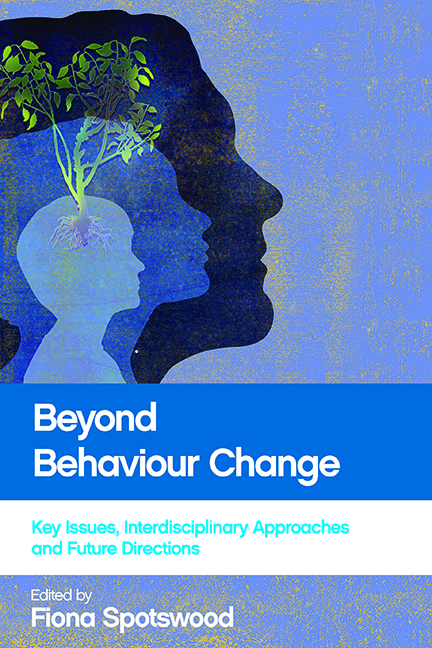two - An introduction to theories of behaviour
Published online by Cambridge University Press: 01 September 2022
Summary
Introduction
Approaches to changing behaviour can be divided into theoretical approaches and practical, or applied, approaches. Practitioners often design interventions on the basis of ‘toolkits’ that involve a range of measures that have their basis in various theories about behaviour (although sometimes these toolkits have little discernible theoretical grounding). Importantly, different theoretical understandings (such as economics, psychology and sociology), overtly or tacitly, each define ‘behaviour’ in their own way. For example, social practice theory (introduced in Chapter One and considered in more depth in Chapter Twelve) avoids using the term ‘behaviour’. Instead, it focuses on abstracted behaviours as social phenomena (termed ‘practices’) rather than the specific manifestations of these by discrete individuals. This perspective differs from those that focus on the problematic ‘doing’ or ‘not doing’ of certain things, while leaving the mental, environmental and social causes, drivers and shapers for behaviour open to various interpretations, be these principally internal or external. Each perspective is grounded in a theoretical understanding and related definition of ‘behaviour’. So while it is possible to avoid theory, it can be useful in understanding the origins of many of the tools and underlying assumptions on which much ‘behaviour change’ policy is based. In the limited space available here, this chapter considers a handful of key models and theories that illustrate some common understandings of behaviour that have influenced the policy realm. First, an overview of the history of the various disciplines that have been involved in making sense of ‘behaviour’ is provided.
Interest in behaviour and behaviour change: a brief disciplinary history
Controlling human behaviour, particularly putting constraints on acting on impulse driven by desire, has been a long-term preoccupation of much of humanity. Some form of moral code is the central tenet of all religions and spiritual philosophies, for example the Ten Commandments of the Christian Bible, or the Five Precepts in Buddhism. Even here, the basis of the codes differ significantly in nature, with the former being simply set out ‘by order of God’ while the latter are set within a clear logic framework that establishes them as a means to reduce suffering.
- Type
- Chapter
- Information
- Beyond Behaviour ChangeKey Issues, Interdisciplinary Approaches and Future Directions, pp. 27 - 48Publisher: Bristol University PressPrint publication year: 2016



